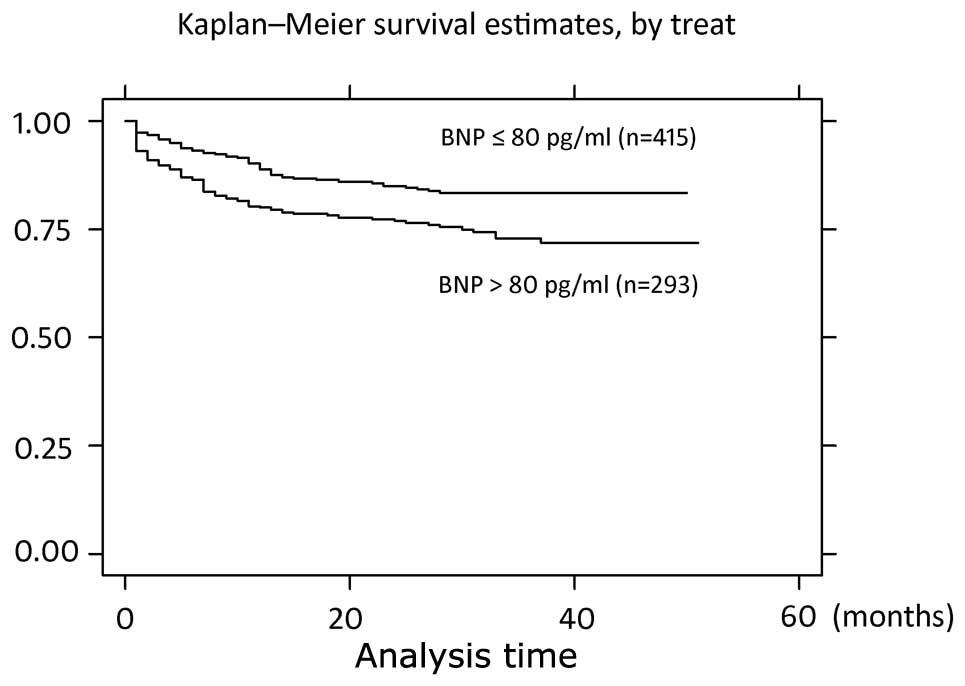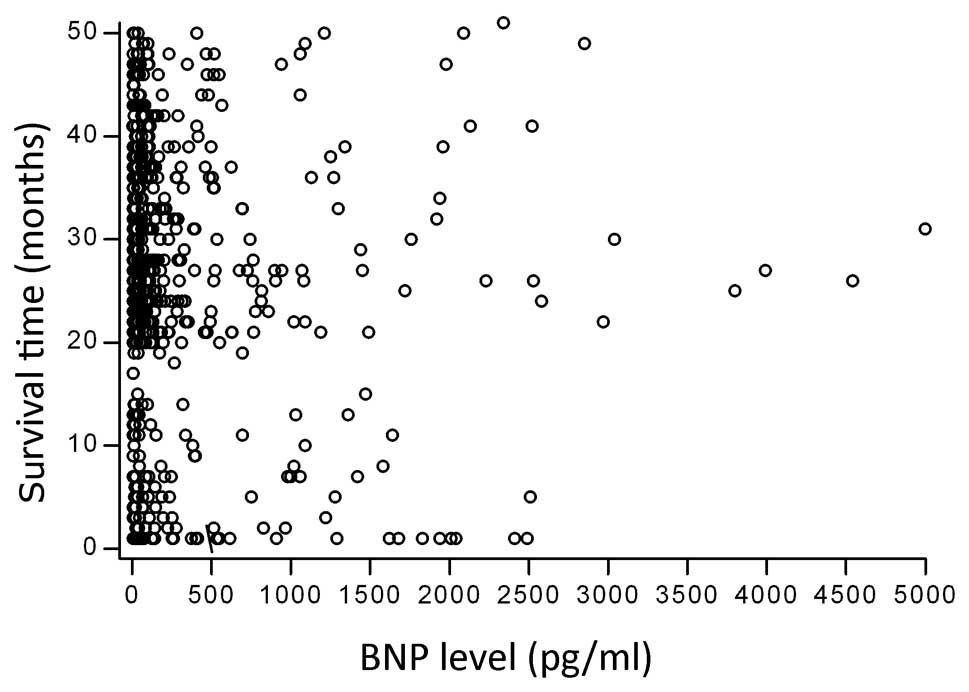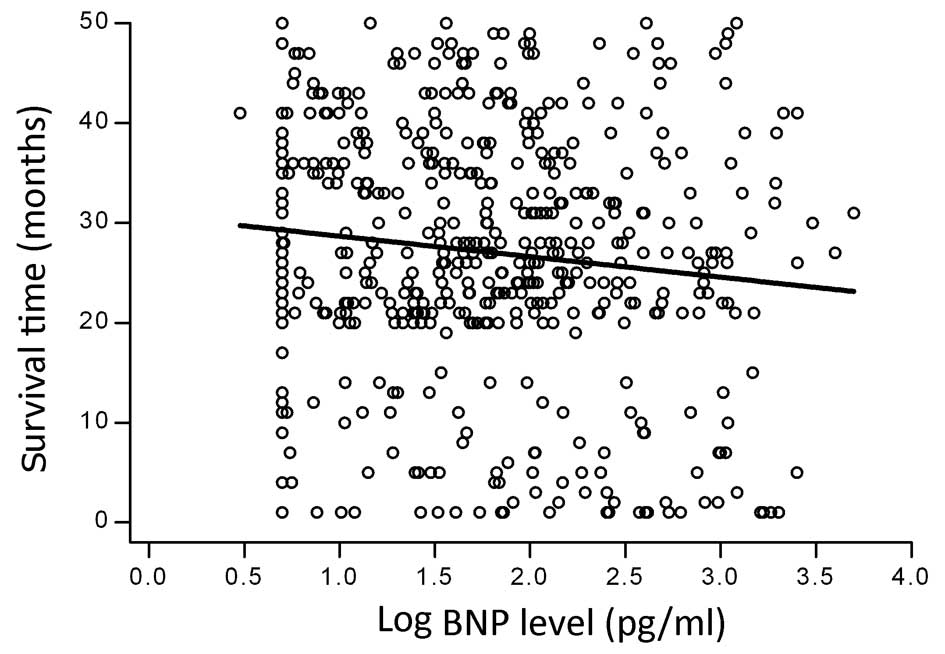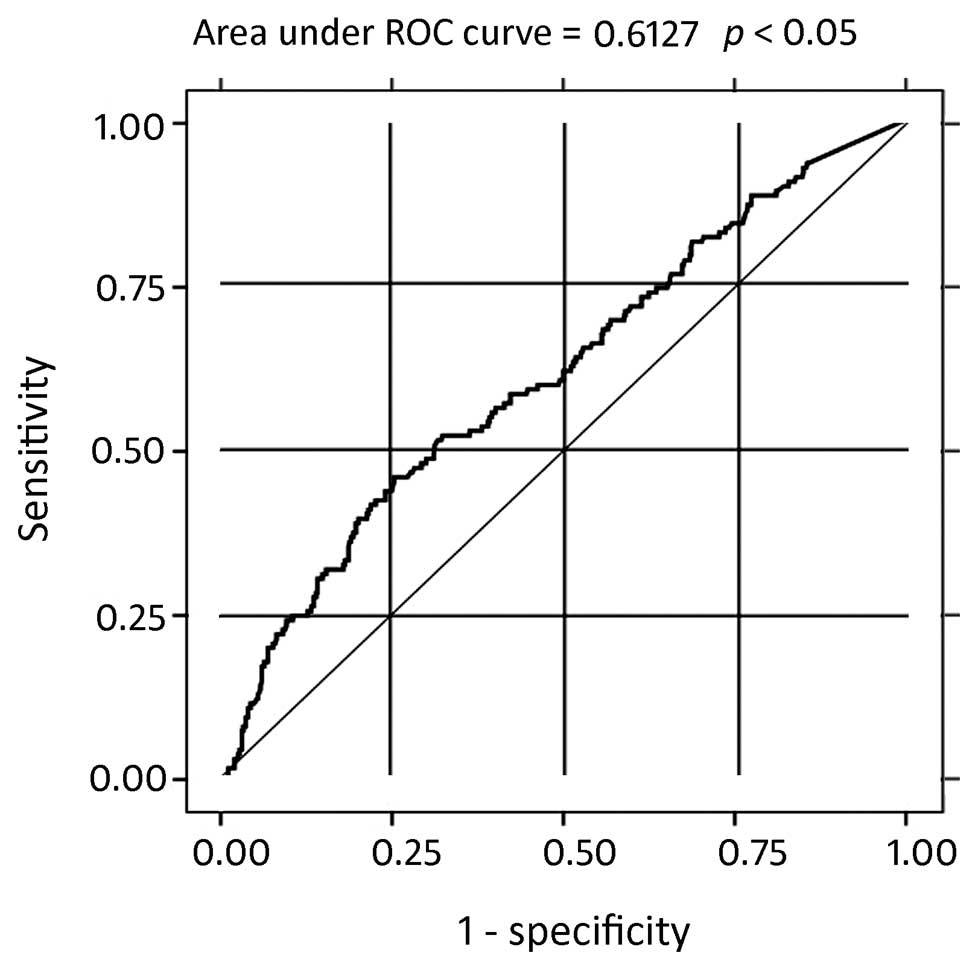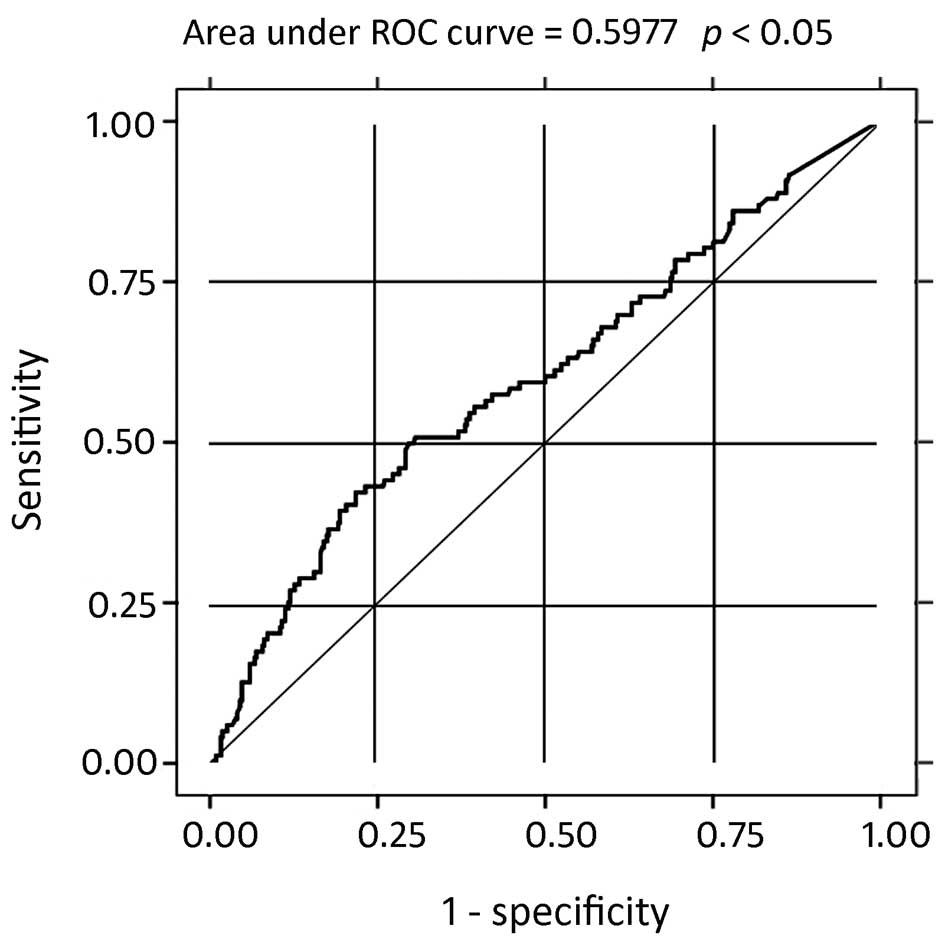|
1
|
Epshteyn V, Morrison K, Krishnaswamy P,
Kazanegra R, Clopton P, Mudaliar S, Edelman S, Henry R and Maisel
A: Utility of B-type natriuretic peptide (BNP) as a screen for left
ventricular dysfunction in patients with diabetes. Diabetes Care.
26:2081–2087. 2003. View Article : Google Scholar : PubMed/NCBI
|
|
2
|
Magnusson M, Melander O, Israelsson B,
Grubb A, Groop L and Jovinge S: Elevated plasma levels of NT-proBNP
in patients with type 2 diabetes without overt cardiovascular
disease. Diabetes Care. 27:1929–1935. 2004. View Article : Google Scholar : PubMed/NCBI
|
|
3
|
Kremastinos DT, Tsiapras DP, Kostopoulou
AG, Hamodraka ES, Chaidaroglou AS and Kapsali ED: NT-proBNP levels
and diastolic dysfunction in beta-thalassaemia major patients. Eur
J Heart Fail. 9:531–536. 2007. View Article : Google Scholar : PubMed/NCBI
|
|
4
|
Sakata K, Iida K, Mochiduki N and Nakaya
Y: Brain natriuretic peptide (BNP) level is closely related to the
extent of left ventricular sympathetic overactivity in chronic
ischemic heart failure. Inter Med. 48:393–400. 2009. View Article : Google Scholar
|
|
5
|
McKie PM, Rodeheffer RJ, Cataliotti A,
Martin FL, Urban LH, Mahoney DW, Jacobsen SJ, Redfield MM and
Burnett JC Jr: Amino-terminal proB-type natriuretic peptide and
B-type natriuretic peptide: Biomarkers for mortality in a large
community-based cohort free of heart failure. Hypertension.
47:874–880. 2006. View Article : Google Scholar : PubMed/NCBI
|
|
6
|
Krittayaphong R, Boonyasirinant T,
Saiviroonporn P, Thanapiboonpol P, Nakyen S and Udompunturak S:
Correlation between NT-pro BNP levels and left ventricular wall
stress, sphericity index and extent of myocardial damage: A
magnetic resonance imaging study. J Card Fail. 14:687–694. 2008.
View Article : Google Scholar : PubMed/NCBI
|
|
7
|
Karaca I, Gülcü E, Yavuzkir M, Dağli N,
Ilkay E, Ozbay Y, Işik A and Arslan N: B-type natriuretic peptide
level in the diagnosis of asymptomatic diastolic dysfunction.
Anadolu Kardiyol Derg. 7:262–267. 2007.PubMed/NCBI
|
|
8
|
Kremastinos DT, Hamodraka E, Parissis J,
Tsiapras D, Dima K and Maisel A: Predictive value of B-type
natriuretic peptides in detecting latent left ventricular diastolic
dysfunction in beta-thalassemia major. Am Heart J. 159:68–74. 2010.
View Article : Google Scholar : PubMed/NCBI
|
|
9
|
Panou FK, Kotseroglou VK, Lakoumentas JA,
Chrysanthopoulou SA, Armeniakos JA, Stratigou T, Veve H and
Zacharoulis AA: Significance of brain natriuretic peptide in the
evaluation of symptoms and the degree of left ventricular diastolic
dysfunction in patients with hypertrophic cardiomyopathy. Hellenic
J Cardiol. 47:344–351. 2006.PubMed/NCBI
|
|
10
|
Eroglu S, Yildirir A, Bozbas H, Aydinalp
A, Ulubay G, Eldem O, Simsek V, Ozin B and Muderrisoglu H: Brain
natriuretic peptide levels and cardiac functional cpacity in
patients with dyspnea and isolated diastolic dysfunction. Int Heart
J. 48:97–106. 2007. View Article : Google Scholar : PubMed/NCBI
|
|
11
|
Gong H, Wang X, Ling Y, Shi Y and Shi H:
Prognostic value of brain natriuretic peptide in patients with
heart failure and reserved left ventricular systolic function. Exp
Ther Med. 7:1506–1512. 2014.PubMed/NCBI
|
|
12
|
Teichholz LE, Kreulen T, Herman MV and
Gorlin R: Problems in echocardiographic volume determinations:
Echocardiographic-angiographic correlations in the presence of
absence of asynergy. Am J Cardiol. 37:7–11. 1976. View Article : Google Scholar : PubMed/NCBI
|
|
13
|
He Q, Wu G and Lapointe MC: Isoproterenol
and cAMP regulation of the human brain natriuretic peptide gene
involves Src and Rac. Am J Physiol Endocrinol Metab.
278:E1115–E1123. 2000.PubMed/NCBI
|
|
14
|
Suo M, Hautala N, Földes G, Szokodi I,
Tóth M, Leskinen H, Uusimaa P, Vuolteenaho O, Nemer M and Ruskoaho
H: Posttranscriptional control of BNP gene expression in
angiotensin II-induced hypertension. Hypertension. 39:803–808.
2002. View Article : Google Scholar : PubMed/NCBI
|
|
15
|
James SK, Lindahl B, Siegbahn A,
Stridsberg M, Venge P, Armstrong P, Barnathan ES, Califf R, Topol
EJ, Simoons ML and Wallentin L: N-terminal pro-brain natriuretic
peptide and other risk markers for the separate prediction of
mortality and subsequent myocardial infarction in patients with
unstable coronary artery disease: A global utilization of
strategies to open occluded arreries (GUSTO)-IV substudy.
Circulation. 108:275–281. 2003. View Article : Google Scholar : PubMed/NCBI
|
|
16
|
Morrow DA, de Lemos JA, Blazing MA,
Sabatine MS, Murphy SA, Jarolim P, White HD, Fox KA, Califf RM and
Braunwald E: Investigators: Prognostic value of serial B-type
natriuretic peptide testing during follow-up of patients with
unstable coronary artery disease. JAMA. 294:2866–2871. 2005.
View Article : Google Scholar : PubMed/NCBI
|
|
17
|
Morrow DA, de Lemos JA, Sabatine MS,
Murphy SA, Demopoulos LA, DiBattiste PM, McCabe CH, Gibson CM,
Cannon CP and Braunwald E: Evaluation of B-type natriuretic peptide
for risk assessment in unstable angina/non-ST-elevation myocardial
infarction: B-type natriuretic peptide and prognosis in
TACTICS-TIMI 18. J Am Coll Cardiol. 41:1264–1272. 2003. View Article : Google Scholar : PubMed/NCBI
|
|
18
|
Ceriani L and Giovanella L: Cardiac
natriuretic peptides after myocardial infarction: Relationship with
infarct size, left ventricular function and remodelling assessed by
99mTc-sestamibi gated-single photon emission tomography. Clin Chem
Lab Med. 45:226–231. 2007. View Article : Google Scholar : PubMed/NCBI
|
|
19
|
Kragelund C, Grønning B, Køber L,
Hildebrandt P and Steffensen R: N-terminal pro-B-type natriuretic
peptide and long-term mortality in stable coronary heart disease. N
Engl J Med. 352:666–675. 2005. View Article : Google Scholar : PubMed/NCBI
|
|
20
|
Barbosa MM, Nunes Mdo C, Castro LR,
Nominato LF, Alencar MC and Ribeiro AL: Correlation between NT-pro
BNP levels and early mitral annulus velocity (E') in patients with
non-ST-segment elevation acute coronary syndrome. Echocardiography.
25:353–359. 2008. View Article : Google Scholar : PubMed/NCBI
|
|
21
|
Casco VH, Veinot JP, de Kuroski Bold ML,
Masters RG, Stevenson MM and de Bold AJ: Natriuretic peptide system
gene expression in human coronary arteries. J Histochem Cytochem.
50:799–809. 2002. View Article : Google Scholar : PubMed/NCBI
|
|
22
|
Weber M, Dill T, Arnold R, Rau M, Ekinci
O, Müller KD, Berkovitsch A, Mitrovic V and Hamm C: N-terminal
B-type natriuretic peptide predicts extent of coronary artery
disease and ischemia in patients with stable angina pectoris. Am
Heart J. 148:612–620. 2004. View Article : Google Scholar : PubMed/NCBI
|
|
23
|
Omland T: B-type natriuretic peptides:
Prognostic markers in stable coronary artery disease. Expert Rev
Mol Diagn. 8:217–225. 2008. View Article : Google Scholar : PubMed/NCBI
|
|
24
|
Goetze JP, Christoffersen C, Perko M,
Arendrup H, Rehfeld JF, Kastrup J and Nielsen LB: Increased cardiac
BNP expression associated with myocardial ischemia. FASEB J.
17:1105–1107. 2003.PubMed/NCBI
|
|
25
|
Goetze JP, Gore A, Møller CH, Steinbrüchel
DA, Rehfeld JF and Nielsen LB: Acute myocardial hypoxia increases
BNP gene expression. FASEB J. 18:1928–1930. 2004.PubMed/NCBI
|
|
26
|
Omland T, Persson A, Ng L, O'Brien R,
Karlsson T, Herlitz J, Hartford M and Caidahl K: N-terminal
pro-B-type natriuretic peptide and long-term mortality in acute
coronary syndromes. Circulation. 106:2913–2918. 2002. View Article : Google Scholar : PubMed/NCBI
|
|
27
|
de Lemos JA, Morrow DA, Bentley JH, Omland
T, Sabatine MS, McCabe CH, Hall C, Cannon CP and Braunwald E: The
prognostic value of B-type natriuretic peptide in patients with
acute coronary syndromes. N Engl J Med. 345:1014–1021. 2001.
View Article : Google Scholar : PubMed/NCBI
|
|
28
|
Kragelund C, Gustafsson I, Omland T,
Grønning B, Køber L, Faber J, Strande S, Steffensen R and
Hildebrandt P: Prognostic value of NH2-terminal proB-type
natriuretic peptide in patients with diabetes and stable coronary
heart disease. Diabetes Care. 29:1411–1413. 2006. View Article : Google Scholar : PubMed/NCBI
|
|
29
|
Kelder JC, Rutten FH and Hoes AW:
Clinically relevant diagnostic research in primary care: The
example of B-type natriuretic peptides in the detection of heart
failure. Fam Pract. 26:69–74. 2009. View Article : Google Scholar : PubMed/NCBI
|
|
30
|
Redfield MM, Jacobsen SJ, Burnett JC Jr,
Mahoney DW, Bailey KR and Rodeheffer RJ: Burden of systolic and
diastolic ventricular dysfunction in the community: Appreciating
the scope of the heart failure epidemic. JAMA. 289:194–202. 2003.
View Article : Google Scholar : PubMed/NCBI
|
|
31
|
Shimabukuro M, Higa N, Oshiro Y, Asahi T
and Takasu N: Diagnostic utility of brain-natriuretic peptide for
left ventricular diastolic dysfunction in asymptomatic type 2
diabetic patients. Diabetes Obes Metabo. 9:323–329. 2007.
View Article : Google Scholar
|
|
32
|
Görmüş U, Ozmen D, Ozmen B, Parildar Z,
Ozdoğan O, Mutaf I and Bayindir O: Serum N-terminal-pro-brain
natriuretic peptide (NT-pro-BNP) and homocysteine levels in type 2
diabetic patients with asymptomatic left ventricular diastolic
dysfunction. Diabetes Res Clin Pract. 87:51–56. 2010. View Article : Google Scholar : PubMed/NCBI
|
|
33
|
Metra M, Ponikowski P, Dickstein K,
McMurray JJ, Gavazzi A, Bergh CH, Fraser AG, Jaarsma T, Pitsis A,
Mohacsi P, et al: Advanced chronic heart failure: A position
statement from the study group on advanced heart failure of the
heart failure association of the european society of cardiology.
Eur J Heart Fail. 9:684–694. 2007. View Article : Google Scholar : PubMed/NCBI
|
|
34
|
Nagueh SF, Appleton CP, Gillebert TC,
Marino PN, Oh JK, Smiseth OA, Waggoner AD, Flachskampf FA, Pellikka
PA and Evangelista A: Recommendations for the evaluation of left
ventricular diastolic function by echocardiography. J Am Soc
Echocardiogr. 22:107–133. 2009. View Article : Google Scholar : PubMed/NCBI
|
|
35
|
Grewal J, McKelvie R, Lonn E, Tait P,
Carlsson J, Gianni M, Jarnert C and Persson H: BNP and NT-proBNP
predict echocardiographic severity of diastolic dysfunction. Eur J
Heart Fail. 10:252–259. 2008. View Article : Google Scholar : PubMed/NCBI
|
|
36
|
Kotaska K, Popelova J, Tiserova M, Telekes
P, Vrzanova M, Bronsky J, Halacova M, Kukacka J and Prusa R:
NT-proBNP and BNP values in cardiac patients with different degree
of left ventricular systolic dysfunction. Biomed Pap Med Fac Univ
Palacky Olomouc Czech Repub. 150:125–130. 2006. View Article : Google Scholar : PubMed/NCBI
|
|
37
|
Mair J, Hammerer-Lercher A and Puschendorf
B: The impact of cardiac natriuretic peptide determination on the
diagnosis and management of heart failure. Clin Chem Lab Med.
39:571–588. 2001. View Article : Google Scholar : PubMed/NCBI
|
|
38
|
Ruskoaho H: Cardiac hormones as diagnostic
tools in heart failure. Endor Rev. 24:341–356. 2003. View Article : Google Scholar
|
|
39
|
Ray P, Arthaud M, Birolleau S, Isnard R,
Lefort Y, Boddaert J and Riou B: Comparison of brain natriuretic
peptide and probrain natriuretic peptide in the diagnosis of
cardiogenic pulmonary edema in patients ages 65 and older. J Am
Geriatr Soc. 53:643–648. 2005. View Article : Google Scholar : PubMed/NCBI
|
|
40
|
Sykes E, Karcher RE, Eisenstadt J, Tushman
DA, Balasubramaniam M, Gusway J and Perason VJ: Analytical
relationships among Biosite, Bayer and Roche methods for BNP and
NT-proBNP. Am J Clin Pathol. 123:584–590. 2005. View Article : Google Scholar : PubMed/NCBI
|
|
41
|
Fonarow GC ADHERE Scientific Advisory
Committee: The acute decompensated heart failure national registry
(ADHERETM): Opportunities to improve care of patients hospitalized
with acute decompensated heart failure. Rev Cardiovasc Med. 4(Suppl
7): S21–S30. 2003.
|
|
42
|
Vickery S, Price CP, John RI, Abbas NA,
Webb MC, Kempson ME and Lamb EJ: B-type natriuretic peptide (BNP)
and amino-terminal proBNP in patients with CKD: Relationship to
renal function and left ventricular hypertrophy. Am J Kidney Dis.
46:610–620. 2005. View Article : Google Scholar : PubMed/NCBI
|
|
43
|
Richards AM, Nicholls MG, Espiner EA,
Lainchbury JG, Troughton RW, Elliott J, Frampton C, Turner J,
Crozier IG and Yandle TG: B-type natriuretic peptides and ejection
fraction for prognosis after myocardial infarction. Circulation.
107:2786–2792. 2003. View Article : Google Scholar : PubMed/NCBI
|















